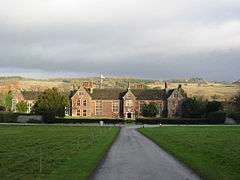Sir John Borlase, 1st Baronet
Sir John Borlase, 1st Baronet (21 August 1619 – 8 August 1672) of Bockmer, Medmenham, Buckinghamshire was an English politician who sat in the House of Commons between 1640 and 1644. He supported the Royalist cause in the English Civil War.
Background

Borlase was born at the Popham family seat of Littlecote House, Wiltshire, the eldest son of Sir William Borlase and his wife Amy Popham, daughter of Sir Francis Popham.[1] William Borlase MP his younger brother.
He was educated at Magdalen Hall, Oxford, where he was matriculated on 30 April 1635. He was called to the Bar by the Inner Temple in the following year.[2]
Career
In April 1640, Borlase was elected Member of Parliament for Great Marlow in the Short Parliament.[1] His re-election as MP for Marlow to the Long Parliament in November 1640 was declared void after a dispute. Instead Borlase was returned as MP for Corfe Castle in 1641.[1] On 4 May 1642, he was created baronet of Bockmer, in the County of Buckingham.[3] He was disabled from sitting for his Royalist tendencies in 1644.[1] In 1645, he was imprisoned by order of Oliver Cromwell, but released for a fine of 2400 £ a year later.[4]
After the Restoration, Borlase represented Wycombe in the Cavalier Parliament from 1661 until his death in 1672.[1]
Borlase died, aged 52 at Bockmer and was buried in Little Marlow four days later.[1]
Family
Borlase married Alice Bankes, daughter of Sir John Bankes, Chief Justice of the Common Pleas and his wife Mary Hawtrey, at St Giles in the Fields, London on 4 December 1637.[1] They had seven children, six daughters and one son.[1] He was succeeded in the baronetcy by his only son John.[5] John had no issue, and on his death his estates passed to his nephew, Borlase Warren, the son of his sister Anne.
References
- History of Parliament Online - Borlase, Sit John, 1st Bt.
- 'Alumni Oxonienses, 1500-1714: Bludworth-Brakell', Alumni Oxonienses 1500-1714: Abannan-Kyte (1891), pp. 142-170. Date accessed: 16 May 2011
- Courthope, William (1835). Synopsis of the Extinct Baronetage of England. London: G. Woodfall. p. 27.
- David A. Schoonover, ed. (1998). Ladie Borlase's receiptes booke. University of Iowa Press. p. 8. ISBN 0-87745-636-4.
- Burke, John (1841). John Bernhard Burke (ed.). A Genealogical and Heraldic History of the Extinct and Dormant Baronetcies of England, Ireland and Scotland (2nd ed.). London: Scott, Webster, and Geary. p. 75.
| Parliament of England | ||
|---|---|---|
| Preceded by Parliament suspended since 1629 |
Member of Parliament for Great Marlow 1640 With: Sir William Hicks, 1st Baronet Gabriel Hippesley |
Succeeded by Bulstrode Whitelocke Peregrine Hoby |
| Preceded by Sir Francis Windebank Giles Green |
Member of Parliament for Corfe Castle 1640–1644 With: Giles Green |
Succeeded by Giles Green Francis Chettel |
| Preceded by Edmund Petty Richard Browne |
Member of Parliament for Wycombe 1661–1672 With: Sir Edmund Pye, Bt |
Succeeded by Sir John Borlase, Bt Sir Edmund Pye, Bt |
| Baronetage of England | ||
| New creation | Baronet (of Bockmer) 1642–1672 |
Succeeded by John Borlase |